President Muhammadu Buhari yesterday ordered all government ministries, departments and agencies (MDAs) from engaging in any form of recruitment without obtaining presidential clearance. The decision is to prevent swelling their expenses and ultimately altering the implementation of the budget.
President Buhari gave the order in Abuja, while presenting the N8.6 trillion 2018 budget before the joint session of the National Assembly. He said government remains determined to grow the economy and as such would run a trim and efficient workforce. President Buhari said government expects 2018 to be a year of better outcomes.
“The tepid economic recovery is expected to pick up pace and the global political terrain is expected to stabilise. The International Monetary Fund (IMF) is anticipating global GDP growth of 3.7 per cent in 2018. Emerging markets and developing economies are expected to lead with GDP growth of 4.9 percent, while advanced economies are projected to grow at a slower rate of 2 percent,” he stated.
He said the 2018 budget was premised on oil price benchmark of US$45 per barrel; oil production estimate of 2.3 million barrels per day, including condensates; exchange rate of N305/US$ for 2018; real GDP growth of 3.5 per cent and inflation rate of 12.4 per cent.
In the oil and gas sector, President Buhari said relatively higher crude oil prices supported Nigeria’s economic recovery, noting that mutually beneficial engagements with oil producing communities in the Niger Delta contributed immensely to the recovery in oil production experienced in recent months.
“Based on these assumptions, total revenue of N5.084 trillion was projected to fund aggregate expenditure of N7.441 trillion. A projected fiscal deficit of N2.356 trillion was to be financed mainly by domestic and external borrowing. On revenue performance, collections were 14 per cent below target as of September 2017, mainly due to the shortfall in non-oil revenues. A key revenue shortfall was from independent revenues; only N155.14 billion was remitted by September 2017 as against the projected prorated sum of N605.87 billion. This represents a 74 per cent shortfall, which is very disappointing.”
Buhari said he had directed the Economic Management Team (EMT) to review the fiscal profiles of these agencies, to ensure strict compliance with the applicable executive orders and financial regulations. The breakdown of the budget estimates are as follows:
Budget size: N8.612 trillion (16 % higher than 2017 estimates)
Assumptions, projections
==================
• Benchmark crude oil price-US$45 per barrel
• Oil production estimate – 2.3 million barrels per day
• Exchange rate – N305/US$ for 2018
• Real GDP growth of 3.5 per cent
• Inflation Rate of 12.4 per cent
Expenditure Estimates
================
The proposed aggregate expenditure of N 8.612 trillion (16 per cent above 2017 budget estimate) will comprise
• Recurrent Costs of N3.494 trillion
• Debt Service of N2.014 trillion
• Statutory Transfers of about N456 billion
• Sinking Fund of N220 billion (to retire maturing bond to local contractors)
• Capital Expenditure of N2.428 trillion (excluding the capital component of statutory transfers).
Recurrent Expenditure
=================
A substantial part of the recurrent cost proposal for 2018 is for the payment of salaries and overheads in key ministries providing critical public services such as:
• N510.87 billion for Interior
• N435.01 billion for Education
• N422.43 billion for Defence
• N269.34 billion for Health
Capital Expenditure
===============
Key capital spending allocations in the 2018 Budget include:
• Power, Works and Housing: N555.88 billion
• Transportation: N263.10 billion
• Special Intervention Programmes: N150.00 billion
• Defence: N145.00 billion
• Agriculture and Rural Development N118.98 billion
• Water Resources: N95.11 billion
• Industry, Trade and Investment: N82.92 billion
• Interior: N63.26 billion
• Education N61.73 billion
• Universal Basic Education Commission: N109.06 billion
• Health: N71.11 billion
• Federal Capital Territory: N40.30 billion
• Zonal Intervention Projects N100.00 billion
• North East Intervention Fund N45.00 billion
• Niger Delta Ministry: N53.89 billion
• Niger Delta Development Commission: N71.20 billion.
Key projects and programmes to be implemented in 2018:
=========================================
• N9.8 billion for the Mambilla hydro power project, including N8.5 billion as counterpart
funding
• N12 billion counterpart funding for earmarked transmission lines and substations
• N35.41 billion for the National Housing Programme
• N10.00 billion for the 2nd Niger Bridge
• About N300 billion for the construction and rehabilitation of strategic roads
Regional Spending Priorities for Peace, Security and Development
==============================================
• N65 billion for the Presidential Amnesty Programme has been retained in the 2018 Budget
• Capital provision for the Ministry of Niger Delta increased to N53.89 billion from the N34.20 billion provided in 2017
• Completion of East-West Road, with a provision of about N17.32 billion in 2018





















